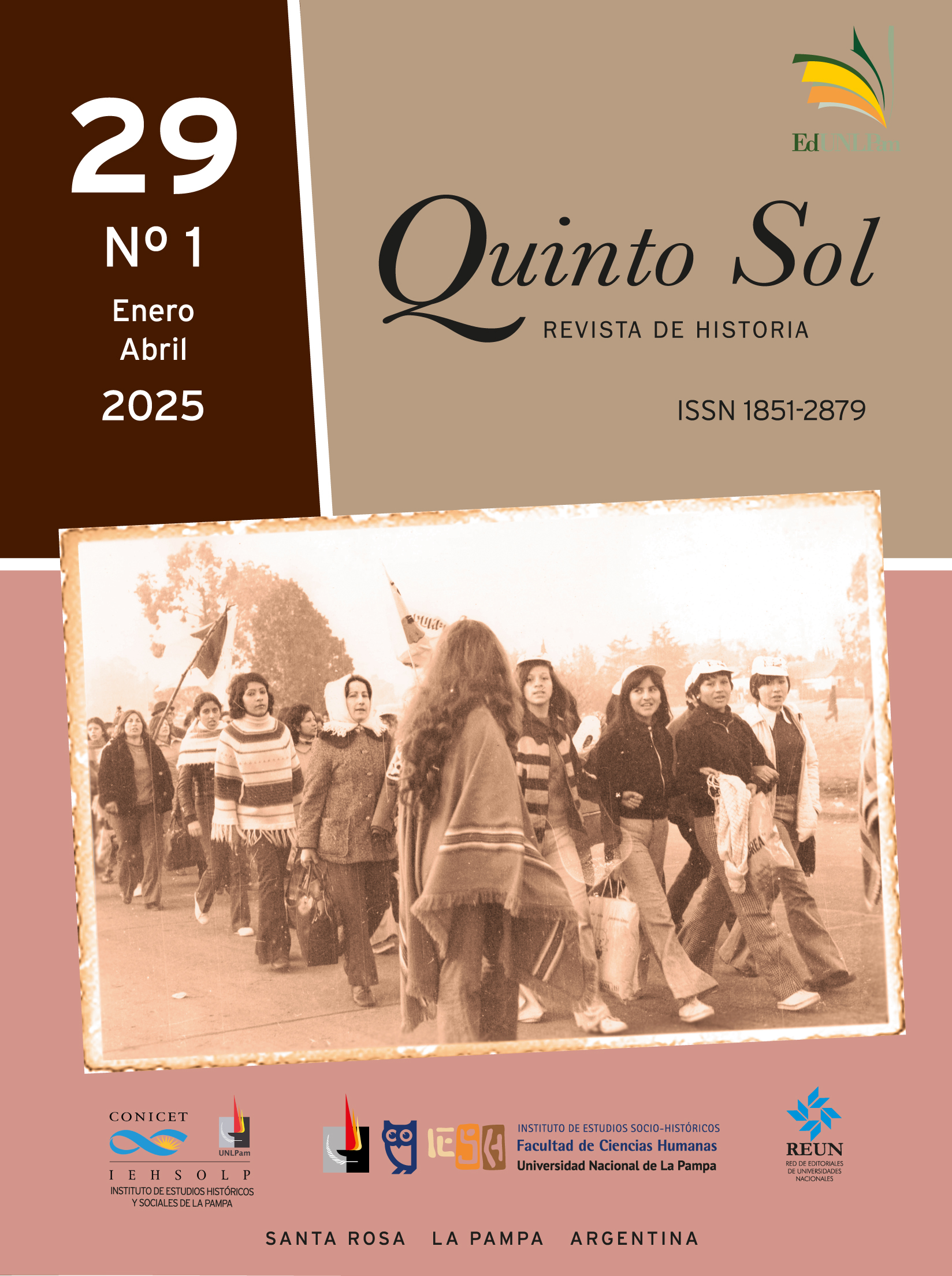When counterculture entered adulthood: memoirs of Miguel Grinberg and his contributions to the construction of a generation
DOI:
https://doi.org/10.19137/qs.v29i1.8477Keywords:
counterculture, memory, youthAbstract
The work recovers a series of interventions developed by the journalist and cultural producer Miguel Grinberg between 1980 and 1988, aimed at consolidating a memory of the Argentine and global counterculture in its original version. From this reconstruction, a series of problems related to the complexity of the hitherto naturalized link between counterculture and youth, and to the definition of a first “sixties” generational identity on the scale of Argentina are analyzed. Likewise, the particularities that countercultural narratives acquired as a modality of processing the recent Argentine past in the context of the so-called “transition” to democracy are addressed.
Downloads
References
Brown, T. (2012). 1968. Transnational and Global Perspectives. Docupedia-Zeitgeschichte, 1-11. http://dx.doi.org/10.14765/zzf.dok.2.272.v1
Buch, E. (2017). Música, dictadura y resistencia. La orquesta de París en Buenos Aires. Fondo de Cultura Económica.
Burkart, M. (2017). De Satiricón a Humor. Risa y política en la Argentina de los setenta. Miño y Dávila.
Clarke, J., Hall, S., Jefferson, T. y Roberts, B. (2014). Subculturas, culturas y clase. En S. Hall y T. Jefferson (Eds.) Rituales de resistencia. Subculturas juveniles en la Gran Bretaña de la postguerra (pp. 61-142). Traficantes de Sueños.
Crenzel, E. (2015). La historia política del Nunca Más. Siglo XXI.
Cuello, N. y Disalvo, L. (2020). Ninguna línea recta. Contraculturas punk y políticas sexuales en Argentina 1984-2007. Alcohol & Fotocopias/Tren en Movimiento Ediciones.
De Lucía, D. (2020). Entre Malvinas y Nueva Delhi: imágenes de la India en Argentina en el deshielo de la dictadura. Pacarina del Sur, (45), s.p.
Dunn, C. (2016). Contracultura. Alternative Artes and Social Transformation in Authoritarian Brazil. University of North Carolina Press.
Feld, C. (2015). La prensa de la transición ante el problema de los desaparecidos: el discurso del show del horror. En C. Feld y M. Franco (Comps.) Democracia hora cero: Actores, políticas y debates en los inicios de la postdictadura (pp. 269-316). Fondo de Cultura Económica.
Franco, M. (2014). La teoría de los dos demonios. Un símbolo de la posdictadura argentina. A contracorriente,11(2), 22-52.
Gatto, E. (2012). El nuestro es un combate de creación: la revista Eco Contemporáneo, Argentina 1960–1969. Revista CS, (9), 169-198. https://doi.org/10.18046/recs.i9.1219
Grinberg, M. (1977). La música progresiva argentina. (Cómo vino la mano). Editorial Convergencia.
Hobsbawm, E. (1998). La historia de la identidad no es suficiente. En Sobre la Historia (pp. 266-276). Crítica.
Jameson, F. (1991). Posmodernismo: la lógica cultural del capitalismo avanzado. Paidós.
Judt, T. (2005). Postwar: A History of Europe since 1945. Pinguin Press.
Lucena, D. y Laboreau, G. (Comps.) (2016). Modo mata moda: arte, cuerpo y (micro) política en la Argentina de los 80. Editorial de la Universidad de la Plata.
Manzano, V. (2017). Fraternalmente americanos: el Movimiento Nueva Solidaridad y la emergencia de una contracultura en la década de 1960. Iberoamericana, 17(66), 115-138. https://doi.org/10.18441/ibam.17.2017.66.115-138
Manzano, V. (2018a). La era de la juventud en Argentina. Fondo de Cultura Económica.
Manzano, V. (2018b). Juventud en transición: los significados políticos y culturales de la juventud en la Argentina de la década de 1980. En V. Branguier y E. Fernández (Eds.) Historia cultural, hoy: trece entradas desde América Latina (pp. 173-196). Prohistoria.
Manzano, V. (2019). Los hijos de mayo: generaciones y política en Argentina, 1969-1994. Contenciosa, 7(9), 1-16. https://doi.org/10.14409/contenciosa.v0i9.8775
Medovoi, L. (2005). Rebel: Youth and the Cold War Origins of Identity. Duke University Press.
Nora, P. (2020). La generación como lugar de memoria. Revista Fractal, (75), s.p.
Raggio, M. M. (2020). Redes interamericanas: la participación de Thomas Merton en Eco Contemporáneo. Palimpsesto, 10(17), 39-49. https://doi.org/10.35588/pa.v10i17.4302
Roszak, T. (1970). El nacimiento de una contracultura: la revolución de los centauros. Kairos.
Sánchez Trolliet, A. (2019). Cultura rock, política y derechos humanos en la transición argentina. Contemporánea: Historia y problemas del siglo XX, 10(10), 157-176.
Traverso, E. (2018). Melancolía de izquierda: marxismo, historia y memoria. Fondo de Cultura Económica.
Yinger, M. (1960). Contraculture and subcultures. American Sociological Review, 25(5), 625-635.
Downloads
Published
Issue
Section
License
Copyright (c) 2024 Quinto Sol

This work is licensed under a Creative Commons Attribution-NonCommercial-ShareAlike 4.0 International License.
When submitting their contributions, authors must declare that they have the permission of the file or repository where the documents that are attached to the work were obtained, whatever their format (unpublished manuscripts, images, audiovisual files, etc.). Such permission authorizes their publication and reproduction, releasing the journal and its editors from any liability or claim from third parties.
Likewise, authors must adhere to the Creative Commons license called "Attribution - Non-Commercial CC BY-NC-SA", through which the author allows copying, reproducing, distributing, publicly communicating the work and generating derivative works, as long as the original author is properly quoted and acknowledged. It is not allowed, however, to use the work for commercial purposes. Authors may establish additional agreements for the non-exclusive distribution of the version of the paper published in the journal (for example, placing it in an institutional repository or publishing it in a book), with the acknowledgment of having been published first in this journal.
The publication of content in this journal does not imply any royalty or charge for taxpayers.
Quinto Sol adheres to the DORA (Declaration on Research Assessment) signed in San Francisco, California, on December 16, 2012, and to the Declaration of Mexico (Joint Declaration LATINDEX - REDALYC - CLACSO - IBICT).










4.png)
2.png)












_(2).png)


1.jpg)



1.jpg)





